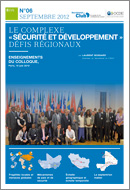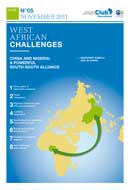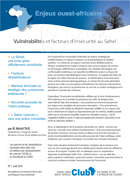West African Challenges

|
Documents synthesizing the state of the debate and addressing various development challenges in the region. |
|
|
Key lessons from the SWAC Colloquium on the Security-Development Nexus West African Challenges, no. 6, 12 June 2012 This paper analyses the links between local insecurities and global threats, the collusion between terrorism and transnational organised crime, the shortcomings of democracy in the region, and the role of West African and African peace and security mechanisms. A special section on Mali features a speech by Mali’s Ambassador to France and an overview of economic and social conditions in northern Mali. The paper makes a strong case for regional responses to West Africa’s security-development challenges and calls for policy actors to seek long-term solutions rather than resorting exclusively to more expedient short-term fixes. |
|
|
China and Nigeria: a powerful South-South alliance
West African Challenges, no. 5, November 2011 Margaret Egbula, Qi Zheng China’s growing involvement in the African continent has drawn intense scrutiny of traditional partners and raises the question of whether or not collaboration is beneficial for African countries and their development goals. No bilateral China-Africa relationship is evolving faster, or impacts more people, than the one between China and Nigeria. The Asian giant going global meets the African giant who aims to become one of the world’s top 20 economies. This paper, co-authored by two young professionals from China and Nigeria, analyses the political, economic and social impact of this powerful South-South alliance. |
|
|
Are economic free zones good for development?
West African Challenges, no. 4, November 2011 François Bost, Geographer, Senior Lecturer at Université de Paris-Ouest-Nanterre- La Défense There are 29 free zones today in 11 West African countries, which can be broken down into free trade zones (6) and export processing zones (23) and to which may be added some 450 “free points”. “Rather than being the driving force for development in West Africa, free zones seem to be simply one among several components of a more general development strategy that has yet to be precisely defined”, concludes François Bost. How, then, can these zones be transformed into effective drivers for development? This paper summarises the key findings of the “World Atlas of Free Zones” (Atlas mondial des zones franches). |
 |
The 2008 rice crisis – shock and new challenges West African Challenges, no. 2, June 2011 West Africa currently imports 5.2 million tonnes of rice, compared with 1.7 million tonnes in the early 1990s, and is only able to cover 60% of its needs despite possessing considerable rice-growing potential. The region will nevertheless for the foreseeable future remain dependent on an international market in which prices are structurally rising and which is increasingly volatile. This paper analyses the crisis of 2008, new trends and policy responses to address new challenges in the rice sector. It is based on a study carried out between May and December 2010 by CILSS, CIRAD, FAO, FEWS NET and the WFP. |
|
|
|
|
|
Vulnerabilities and factors of insecurity in the Sahel West African Challenges, no. 1, August 2010 The blanket media coverage of insecurity reflected in the series of kidnapping of Westerners and burgeoning growth in drug trafficking needs to be examined, according to Mehdi Taje, Geopolitical analyst, Researcher in African studies at Irsem, “cautiously and against the background of foreign powers’ strategies”. The SWAC Secretariat presents Mr. Taje's analysis, highlighting that the activities of the Al-Qaeda Organization in the Islamic Maghreb (AQIM) may well be no more than overstated terrorism which masks the real issues at stake. |
|
> SWAC publications: www.oecd.org/swac/publications |
Related Documents





